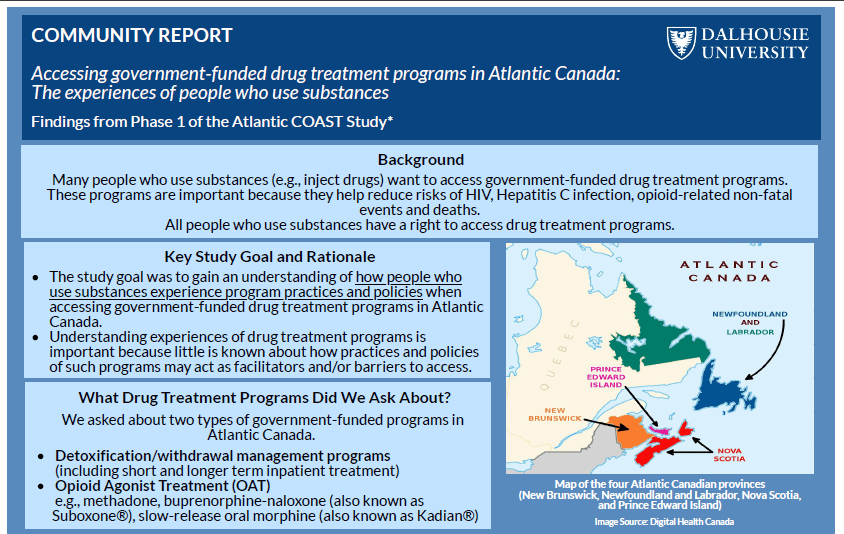![]() Completed
Completed
The Atlantic COmmunity AddictionS Treatment (COAST) study is a multi-year study: Participants in this study identified various facilitators and barriers to access and retention in drug treatment programs. Some barriers and facilitators may vary over time depending on a variety of factors such as how much government funding is provided to a program. Nevertheless, our research suggests the need for 1) Client-centered practices and policies across all programs 2) More program and increased hours of operation. Findings from phases 2 and 3 will be available soon.
Context
Many people who use substances (e.g., inject drugs) want to access government-funded drug treatment programs. These programs are important because they help reduce risks of HIV, Hepatitis C infection, opioid-related non-fatal events and deaths. All people who use substances have a right to access drug treatment programs. This study which consists of 3 phases, examines government-funded drug treatment programs in Atlantic Canada: The experiences of people who use substances
Objective
- The study goal was to gain an understanding of how people who use substances experience program practices and policies when accessing government-funded drug treatment programs in Atlantic Canada.
- Understanding experiences of drug treatment programs is important because little is known about how practices and policies of such programs may act as facilitators and/or barriers to access.
Methods
Semi-structured face-to-face interviews were conducted with people who use substances in 2019 through community- based harm reduction/AIDS service organisations across seven sites in Atlantic Canada.
Funding
Principal Investigator
Lois Jackson, PhD., Dalhousie University
Co-Investigators
- Jane Buxton, BC Centre for Disease Control
- Anik Dubé, Université de Moncton
- Jacqueline Gahagan, Dalhousie University (now at Mount Saint Vincent University)
- Niki Kiepek, Dalhousie University
- Lynne Leonard, University of Ottawa
- Jo-Ann MacDonald, University of Prince Edward Island
- Fiona Martin, Dalhousie University
- Jen Smith, Eastern Health (St. John’s, NL)
- Carol Strike, University of Toronto
Poster

For more information
Please visit the study website by clicking here


